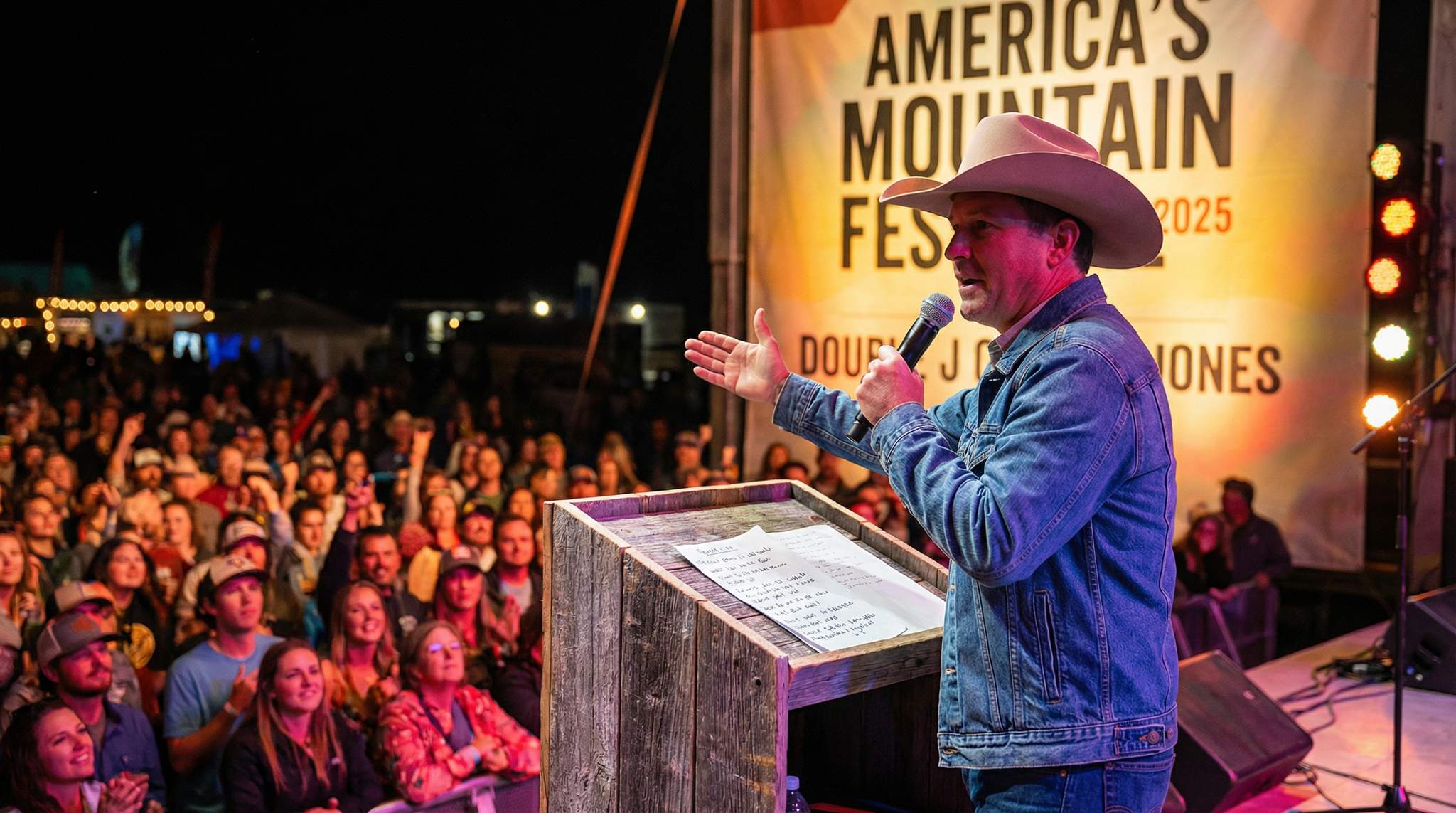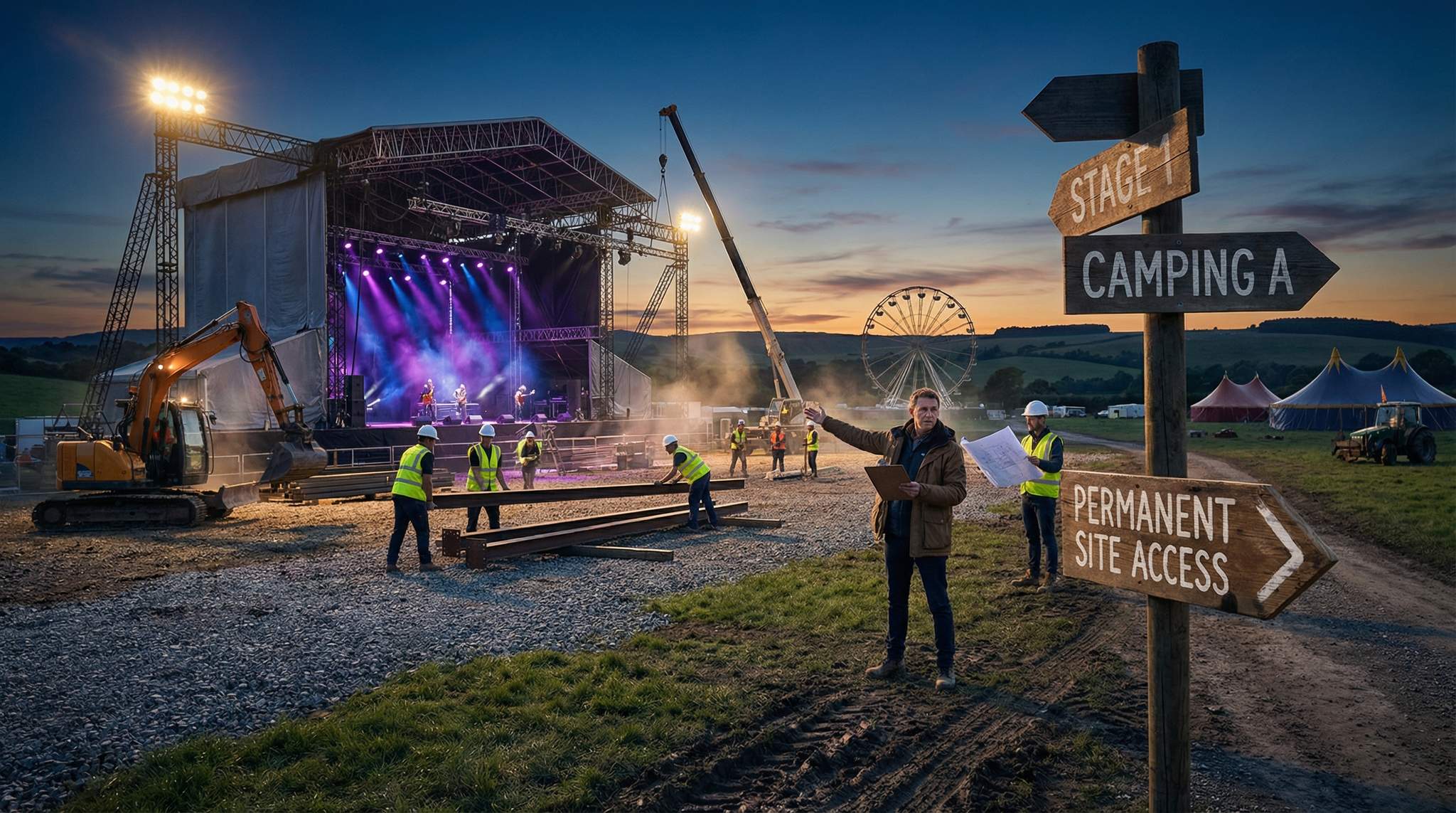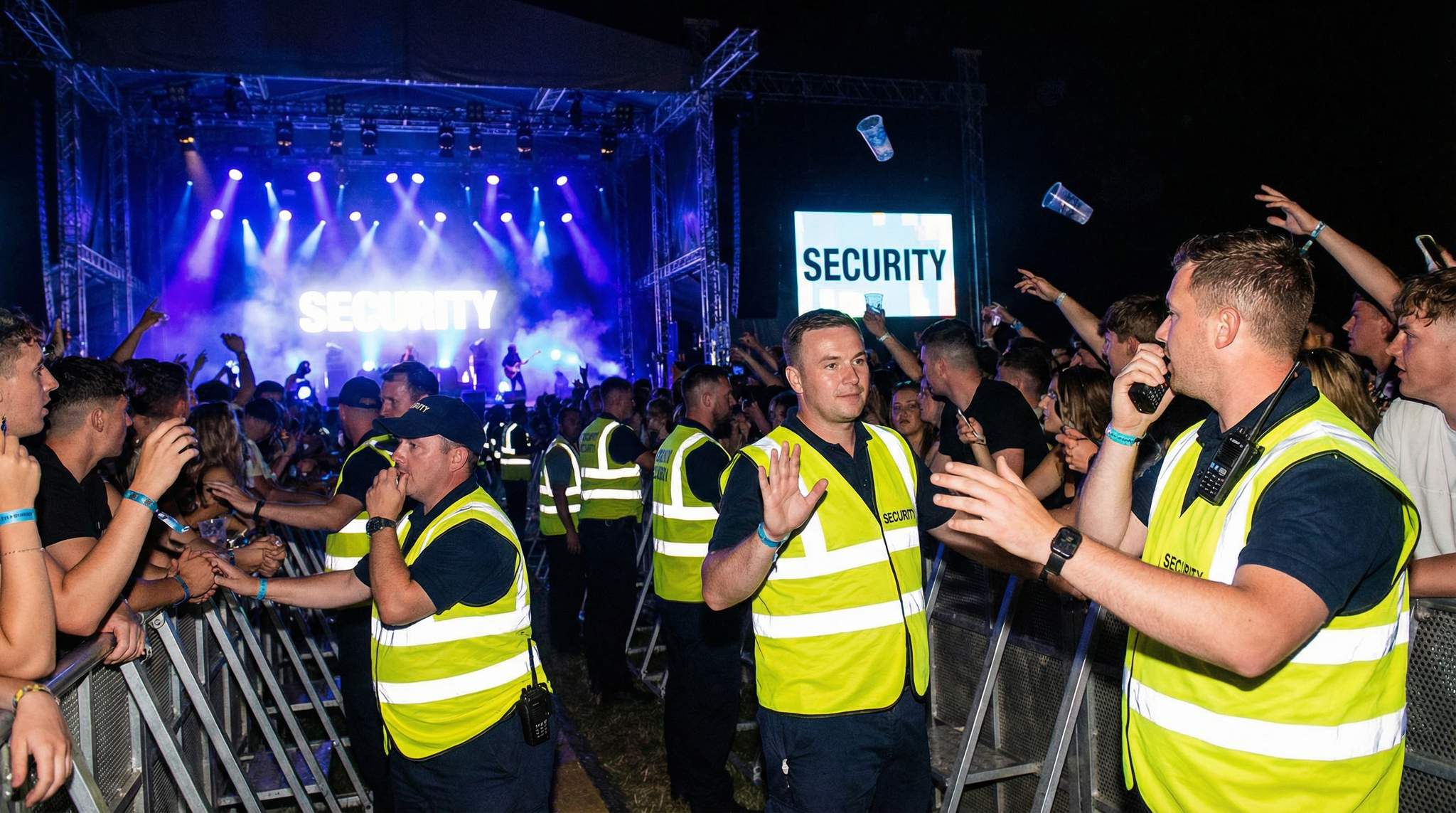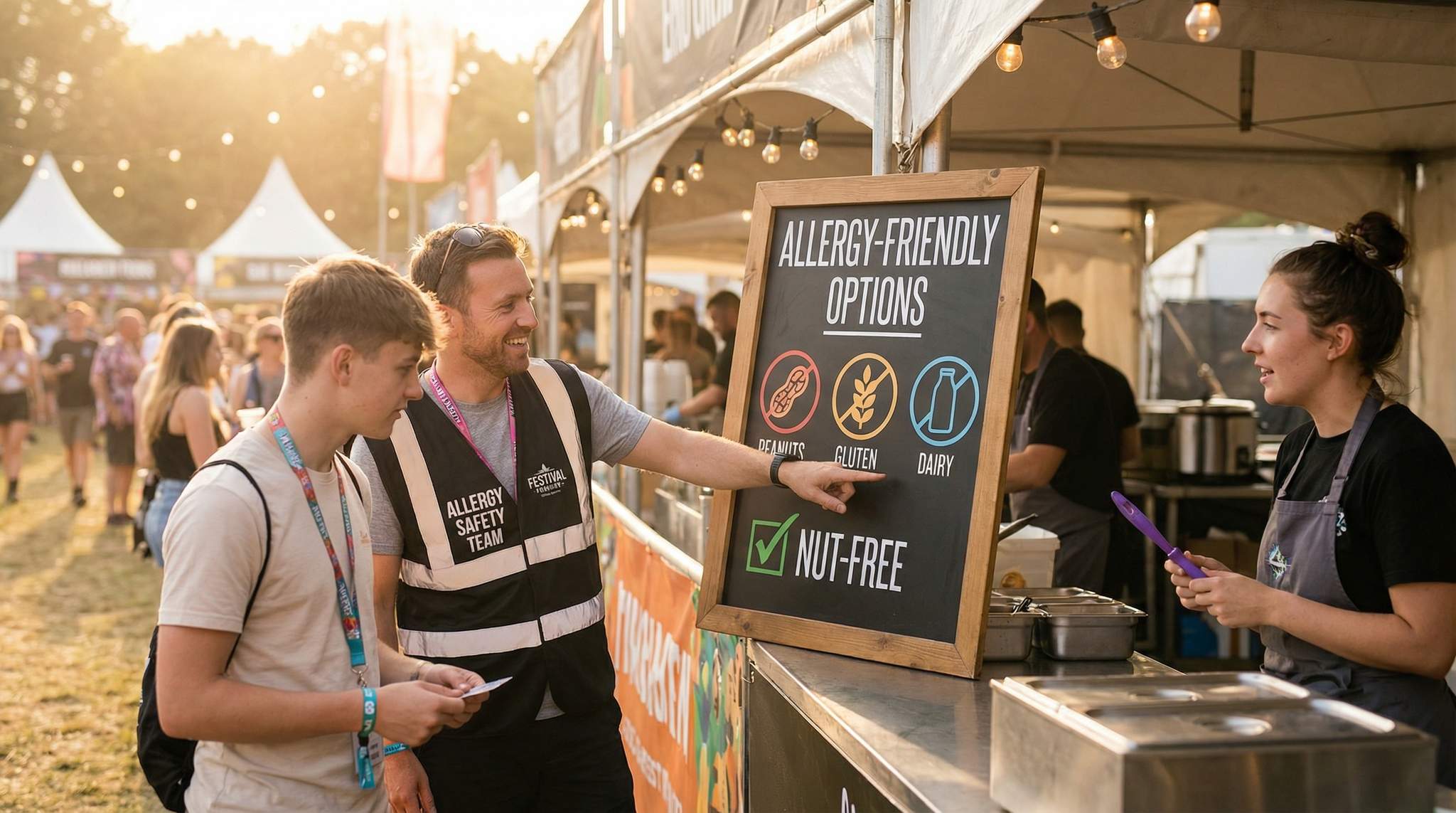Great hosts are the unsung heroes of country music festivals. They set the tone, keep the energy high, and ensure that every act gets a warm welcome. Whether it’s a small-town fair or a multi-stage mega event, a skilled festival MC (Master of Ceremonies) ties the whole day together with professionalism and heart. This guide dives deep into crafting MC scripts, nailing artist introductions (names and all), and celebrating the pride of small communities – all while keeping the show running smoothly.
The Role of a Great Festival MC
A great festival MC does far more than announce band names. They glue the day together, bridging between performances and maintaining the vibe. In country music festivals – especially in tight-knit towns – the MC becomes the friendly face (or voice) the audience relies on for information and entertainment. From hyping up crowds to handling unexpected delays, the MC’s role is crucial.
- Setting the Tone: The MC establishes the festival’s atmosphere from the first “Howdy folks!” Ideally, their style matches the event’s personality. For a relaxed family-friendly country festival, the MC might be warm and humorous; at a rowdy weekend jamboree, they may amp up the crowd with high energy.
- Timekeeper and Flow Manager: Keeping the festival on schedule is part of the job. The MC coordinates with stage managers so that if an act runs overtime or there’s a technical hitch, they can smoothly adjust – maybe by shortening an intro or jumping in with impromptu banter.
- Engagement and Glue: They engage the audience during transitions. This might be a quick story, a local joke, or a call-and-response chant (think “How y’all feeling out there?!”). These moments keep people’s spirits high between acts and prevent lulls. A great MC will feel like a host entertaining guests at a party, making sure everyone’s having a good time even when nothing is actively happening on stage.
Real-world example: At the inaugural America’s Mountain Festival 2025 in Woodland Park, Colorado, festival organizers chose a well-known local radio personality, “Double J” John Jones, as MC. As noted in press coverage announcing the festival lineup, the selection of a Red Dirt country DJ with an impressive track record brought credibility and local flavour. His presence as host ensured the event flowed seamlessly and connected with the community. This kind of savvy choice underscores how important the MC role is to a festival’s success.
Preparing Act Introductions: Pronunciations, Credits & Story Beats
One of the MC’s most visible duties is introducing each artist or band. These introductions should be short, accurate, and engaging. A sloppy intro (like mispronouncing a name or droning on with a long bio) can deflate the crowd and even insult the artist. Here’s how festival organizers can help MCs prepare golden introductions:
Nail the Name (Pronunciations Matter)
Nothing is more cringe-worthy than a festival MC botching an artist’s name. It happens more often than you’d think, especially with rising artists or those from different regions. Always provide the MC with phonetic pronunciations for each performer in the lineup. If an artist’s name is unfamiliar or not pronounced how it’s spelled, include a simple guide (e.g., “Ngariki” – pronounce it “NAH-ree-kee”).
- Do the Research: As a festival producer, double-check the correct pronunciation with the artist’s team ahead of time. International country acts or artists with unique names will appreciate this courtesy.
- Write it Out: On the MC’s cue cards or running sheet, spell names phonetically in parentheses. For instance, next to “Siobhan Kelly” you might write (“shi-VAWN”). This small step prevents mistakes in the heat of the moment.
- Practice Aloud: Encourage the MC to practice saying each name out loud during rehearsals or soundcheck. Repetition builds confidence, so they won’t stumble on stage.
Give Credit Where It’s Due
An introduction is the time to celebrate the act’s achievements and identity, but in a nutshell. Effective festival MCs mention a couple of key credits or accolades to get the audience excited. This could include:
Planning a Festival?
Ticket Fairy's festival ticketing platform handles multi-day passes, RFID wristbands, and complex festival operations.
- Notable songs or awards: For example, “Please welcome the winner of last year’s Country Music Association New Artist of the Year, [Artist Name]!” Or “This next band’s single hit #1 on the country charts last summer.”
- Hometown or origin: In small-town festivals, if an artist has local roots, highlight it to stir up hometown pride – “She grew up just down the road in [Nearby Town]…”.
- Career highlights: Perhaps they’ve toured with a big name (“opened for Luke Bryan on tour”) or have a new album out. One or two brief highlights help establish credibility.
Make sure the info is up-to-date. Nothing’s worse than congratulating an artist on an old accomplishment while ignoring their latest hit. Get an updated bio or press release from each act’s management to pull one or two gems for the intro. Remember: this is not a resume reading, just a teaser.
Story Beats and Personal Touches
Beyond the facts and figures, great intros often include a story beat – a tiny narrative or interesting tidbit that makes the introduction memorable. This could be an anecdote, a quote, or a unique attribute of the performer:
- Anecdotes: “When [Band Name] first played at our local honky-tonk, ten people showed up – now they’re on this big stage about to rock thousands!”
- Inspiring facts: “He was a construction worker by day and honky-tonk singer by night until a viral video changed his life.”
- Crowd connection: “This duo met right here at the festival campgrounds five years ago – and now they’re performing on the main stage!”
Such story beats humanize the artists and create an emotional hook. It makes the crowd feel like they know the performer a little better, enhancing anticipation.
Keep it brief and heartfelt: Pack the pronunciation, one or two credits, and a story beat into a tight intro. Aim for 15–30 seconds maximum. The goal is to amplify the artist’s entrance, not upstage them or bore the audience. As one professional guide to event hosting suggests, weaving details like awards or background into a concise intro elevates the experience. For example, instead of saying “Up next is a band,” a richer intro might be: “These next performers have been lighting up country dance halls across Texas and just won Band of the Year at the Texas Country Awards. Get ready for the high-energy sound of Midnight Rodeo!” In two sentences, the MC has hyped the crowd, given the band credit, and set the stage for a great reception.
Safety Messages with a Personal Touch
Every festival has essential safety and logistics announcements – from where the first aid tent is to reminders about hydration and security. The trick is to deliver these messages in the voice of the event so they don’t feel like dull P.A. system drone.
Fit the Voice of the Event
A country music festival, especially one with small-town flair, has a friendly, down-to-earth vibe. The safety messaging should reflect that. Compare two approaches:
Need Festival Funding?
Get the capital you need to book headliners, secure venues, and scale your festival production.
- Generic: “Attention: Please remember to stay hydrated and use the trash bins. Lost & found is at the info desk.”
- On-Brand: “Folks, it’s a hot one today – don’t forget to drink plenty of water. We’ve got free water refills by the big oak tree next to the beer tent, so y’all take care of yourselves. And if anyone finds a set of car keys with a John Deere keychain, mosey on over to the Lost & Found at the info booth – we’ve got a very relieved farmer looking for them!”
In the second version, the MC still conveys the necessary info (hydration, lost & found) but uses a relatable, informal tone that matches a country festival’s character.
Tips for safety & logistics announcements:
- Keep it Positive: Frame safety tips as encouragements (“We want everyone dancing all night, so remember to take a water break now and then!”) rather than scoldings.
- Use Local References: If the event has unique landmarks (a colored barn, a ferris wheel, a sponsor’s tent), use them in directions. E.g., “First aid is over at the red tent by the old oak tree – our local EMTs from Smith County are there to help if you need anything.”
- Timing Matters: Plan when these announcements happen. Best times are usually between acts when there’s a captive audience but not during any critical artist moments. The MC might do a quick safety rundown after a big act finishes and before the next starts setting up, for instance.
- Mix in Humor or Heart: If it fits the event’s vibe, a dash of humor can make people pay attention. “We know the ground’s a bit muddy after that rain – if you do slip, our first aid folks have band-aids and maybe a hug for you.” At a family-oriented festival, the MC might involve kids: “Parents, if you’re searching for your little cowpoke, check the info tent. We promise they’re not trading ponies without you.”
Most importantly, be clear. However folksy or fun the delivery, the message must be understood. Emergency exits, safety procedures for severe weather, or any urgent announcements should be stated plainly and repeated if needed. A good MC strikes a balance: authoritative when necessary, and easygoing the rest of the time.
Thanking Sponsors & Partners (Without the Phone Book)
Small-town festivals often rely on a web of local sponsors, community organizations, and volunteers. Recognising them on stage is important – they’ve earned the shout-out. But how to do it without putting the crowd to sleep by reading a laundry list of names?
Sincere, Simple Shout-Outs
Audiences tune out if an MC rattles off fifteen sponsor names in a monotone. Instead, coaches the MC to sprinkle sponsor thanks throughout the day in a natural way:
- Group and Theme: Thank sponsors by category rather than all at once. “Let’s hear it for the folks keeping us fed and watered today – big thanks to Mama Dee’s BBQ and Hank’s Brews for the delicious food and drink!” Later, another quick mention: “This stage is powered by some amazing local businesses. Shout out to Carter Electric and Johnson Farm Supplies for making our sound and lights possible!”
- Tell a Mini-Story: If a sponsor is deeply tied to the community, mention it briefly. “Our next act is close to the heart of this town, and so is our sponsor Miller Auto – the Miller family has been helping bring live music here for 20 years. Give ’em a hand for supporting what we do!”
- Highlight Key Partners: Identify which partners must be named (e.g., major sponsors, city councils, tourism boards) and work those into one or two heartfelt thank-yous. Others can be thanked collectively: “We also want to thank all the local businesses and volunteers who chipped in – we couldn’t do this without our community’s support.”
The key is sounding genuine. The MC should sound like they truly appreciate the support (which, of course, they do!). It’s fine to have the wording prepared, but encourage the MC to speak from the heart instead of reading a dry script. Something like: “Folks, we want to take a moment to thank some of the hometown heroes who made today possible…” comes off much better than “The festival committee would like to acknowledge the following sponsors…”.
Avoid dumping all the thank-yous at the very end when the tired crowd is leaving. Spread them out and tie them to relevant moments (for instance, thank the stage crew and production sponsor right after a big act finishes a great set – the crowd will be in a good mood and responsive to applause).
And remember, you don’t have to name every single donor on stage. That’s what festival programs, banners, and websites are for. Pick the top contributors and those that fit naturally into the narrative. The rest can be thanked in bulk (“to all our sponsors, listed on the big sign by the entrance, we love ya!”). This way, the audience stays with you and the thanks still get delivered.
Keeping Intros Tight and Heartfelt
When it’s time to bring out the next act, introductions should be concise but impactful. Too many words can deflate the crowd’s energy; too few can feel impersonal. Tight and heartfelt intros hit the sweet spot.
Tips to keep intros effective:
- Length = 2–3 Sentences: Aiming for around 20–30 seconds per intro helps maintain pace. The festival schedule is often packed, and an MC who waxes poetic for minutes will throw things off track (and possibly annoy artists waiting to play).
- Speak from the Heart: Even with a prepared script, the MC should deliver it with authenticity. If the festival organizer provided a written intro, it helps for the MC to put it in their own words or practice until it feels natural. The audience can sense when words are just being read versus spoken with feeling.
- Build Excitement, Don’t Steal Thunder: The introduction’s job is to get the audience excited about the artist, not about the MC. A heartfelt intro might briefly mention why the MC personally loves this act (if true), or how the crowd is in for a treat. For example: “I’ve been humming this next singer’s new single all week – you’re going to see why it’s climbing the charts.” Just a touch of personal endorsement can hype the crowd.
- Consistency and Variation: If the same MC is introducing multiple acts over a long day, they should avoid a monotonous pattern. Mix up the phrasing and tone slightly (while keeping it positive and professional) so each intro feels fresh. One act’s intro might lean on their Grammy win, the next on their local roots, another on their high-energy reputation.
Case in point: At some major country festivals like CMA Fest in Nashville or Stagecoach in California, multiple hosts or video VOs handle intros, often keeping them extremely tight – basically just name and a tagline – because the schedule is tightly timed. Yet even then, the best MCs manage to squeeze in genuine enthusiasm. On the flip side, at a more intimate festival such as a regional town fair, an MC might afford a slightly more personal intro (remembering still to keep it under half a minute). The common thread at both large and small events is heartfelt brevity.
Embracing Local Pride and Culture
“Small-Town Pride” isn’t just a phrase – it’s often the soul of a country music festival outside the big cities. Festivals in rural areas or small communities carry a strong sense of local identity. A savvy MC taps into that pride to amplify the festival’s spirit.
Here’s how an MC can embrace local culture:
- Use Local Lingo and References: If the town has a nickname, or the locals call themselves something (“We’re proud to be Midland Mudders!”), the MC should feel free to use it. A reference to the local high school football team, a famous landmark, or even an inside joke from the town can earn big cheers.
- Acknowledge the Community: The MC can ask the crowd to applaud not just for the artists but for themselves. e.g. “Give it up for yourselves – what a crowd tonight! We’ve got the friendliest folks in all of [County Name] here!” This fosters unity and pride among attendees.
- Share One Local Story: With planning, the MC might share one quick inspiring story about the community during the day. For example, honoring a local musician who passed away, or congratulating the town’s recent achievements (like a sports championship or a charity drive tied to the event). Keep it short and appropriate, but those moments personalize the festival experience.
Example: The Hodag Country Festival in Rhinelander, Wisconsin, has thrived since 1978 in a small community. Over the decades it developed its own traditions and legends. One recurring performer, Neal McCoy, became such a staple that he’s jokingly known as the festival’s “unofficial mayor” for appearing nearly 30 times, according to local news reports on the festival’s history. An MC at Hodag might playfully remind the audience of this kind of lore – “We want to welcome back our unofficial mayor of Hodag, Mr. Neal McCoy!”, which gets longtime festival-goers grinning. By weaving local festival history and pride into the script, MCs make the event feel like a big family reunion.
In Australia, at the Tamworth Country Music Festival – hosted in a country town with a rich musical heritage – MCs often include Aussie colloquialisms and heartfelt nods to Tamworth’s legacy as “Country Music Capital”. Similarly, in the UK, the traveling Country to Country (C2C) festival brings Nashville stars to London, Glasgow, and Dublin; there, local radio presenters serve as MCs to give each city’s show a personal, local flavour while bridging cultural gaps (often even explaining American artists’ backstories to UK audiences). No matter the country, leaning into local pride makes a festival more than just a series of concerts; it becomes a celebration of community.
Adapt for Scale: Small vs. Large Festival MCing
The fundamentals of MC scripting remain, but scope changes with festival size:
- Small Boutique Festivals: Often one MC handles the whole day, building a close rapport with the crowd. Here, the MC can afford to be more conversational and adaptive. If a delay happens, they might even take impromptu audience questions or bring a guest from the crowd on stage for a quick game. The tone is like a neighborhood block party.
- Huge Multi-Stage Festivals: There might be different MCs for different stages, or none at all for certain slots (with automated voiceovers introducing headliners instead). Communication and consistency become key. Each MC should have the same safety info and sponsor points to mention, and ideally maintain a cohesive style (though each might have their own personality). For instance, at a large festival, the MC might be instructed to keep intros extremely tight due to broadcast or strict scheduling. However, the need for a human touch is still there – in case of unexpected schedule changes or emergencies, a live MC addressing the crowd calmly can make all the difference.
Festival producers should brief MCs on these expectations. At a massive event, an MC might feel weird not whipping the crowd into a frenzy like they would at a small gig, but if the headliner’s production requires precise timing (e.g., a video intro), the MC’s role might be minimal for that set. Conversely, at a smaller festival stage, the MC might be the only thing between an antsy crowd and an empty stage during a 30-minute band setup – they’d better have some stories or activities up their sleeve!
Great Hosts Glue the Days Together
All the preparation in the world – the perfect scripts, the witty lines, the checked-off names – ultimately serves one purpose: to help the MC become a great host. And great hosts truly glue festival days together. They make a series of separate performances feel like one continuous experience.
Seasoned festival organizers know to invest in finding the right MC talent and equipping them well:
- Experience vs. Potential: Sometimes the best MC is a seasoned pro (like a radio DJ or a comedian with stage experience). Other times, a passionate local figure might surprise you. Whoever it is, ensure they understand the responsibility they carry to represent the festival’s voice.
- Preparation and Flexibility: Provide a detailed run sheet and script notes, but also prep the MC on contingency plans. What if an act cancels last-minute? What if weather delays the program? The MC should have a plan (and the festival producer’s guidance) for those scenarios – whether it’s doing a quick Q&A, leading a sing-along, or simply keeping the crowd informed and calm.
- Team Communication: The MC should be in the loop with stage managers, producers, and sound engineers via headset or an onstage monitor. This way, if there’s a shift (“stretch two more minutes” or “skip the next sponsor mention”), they can react seamlessly without awkward pauses.
- Energy Management: A festival day has ebbs and flows. A morning slot might have a sparse crowd; late afternoon sun can tire people out; headliners at night see peak excitement. A great host knows how to adjust – maybe being gentler and welcoming early on (“Good morning, thanks for coming out early, we love to see it!”), and really firing people up as the night falls (“Who’s ready for [Headliner Name]?!” with the crowd roaring). The MC’s energy helps maintain the festival’s overall momentum.
At the end of the day, when attendees leave with smiles (and maybe sunburns), they might not consciously realise it, but the MC’s guiding voice and warmth have been a big part of what made the event feel fun and coherent. It’s often said that an MC did a great job when things went so smoothly, you hardly noticed there was a person orchestrating all those transitions – it just felt naturally exciting and organized.
In summary, being an MC at a country music festival – especially one bursting with local pride – is an art. It’s about scripted preparedness meeting genuine improvisation. The producer’s job is to arm the host with good information, a solid agenda, and the freedom to be themselves on stage for the sake of the show. The host’s job is to be the thread that ties the day together, from first welcome to final goodnight, making sure every artist shines and every attendee feels included in the experience.





